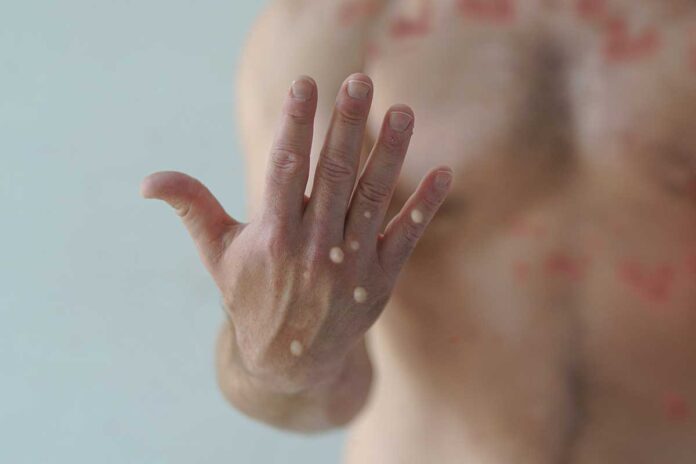As Pride events spread, so do concerns about monkeypox transmission and navigating the fine line between awareness and stigma. The once-rare monkeypox virus is seeing a new surge outside Africa, where it is endemic and is now in several dozen countries. Monkeypox has spread throughout Europe and into the U.K., the U.S. and Australia with more than 1,600 cases in those countries. The overwhelming majority of cases outside Africa have been among gay and bisexual men and men who have sex with men.
As Dr. Matthew Kavanagh, the deputy executive director of the Joint United Nations Programme on HIV/AIDS, said, “Experience shows that stigmatizing rhetoric can quickly disable evidence-based response by stoking cycles of fear, driving people away from health services, impeding efforts to identify cases, and encouraging ineffective, punitive measures.”
In an effort at destigmatizing, the World Health Organization (WHO) also announced it would be working on changing the name of monkeypox, while also considering whether to announce the virus as a global health emergency.
In addition, a Chicago-based gay doctor with large TikTok and Instagram followings shared his experience of getting monkeypox on June 13 viral video in an effort to destigmatize the disease and “spread awareness.” The doctor said that people should “check their bodies,” especially during Pride month, with large gatherings where transmission is more likely. As PGN previously reported, initial outbreaks in Europe have been linked to Pride events and men’s bathhouses.
The doctor, who for privacy goes by the moniker @thatgaydoctor, told his Instagram followers, “I was in disbelief when I saw the lesions because I thought [monkeypox] was still quite rare — but apparently not, which is why I’m sharing.”
The video began with the doctor saying, “Do you want to learn about monkeypox? Because I got it.”
Young, shirtless and explanatory, @thatgaydoctor shows the viewer the lesions beginning to spread on his face, neck, arms, and chest. He details the symptoms and that he will remain quarantined until the lesions scab over and fall off.
The doctor explains that a couple days before making the video, he woke up with swollen lymph nodes, which he showed to viewers, and became “increasingly fatigued,” also experiencing chills. These symptoms are also classic to COVID, but then the doctor “started to break out in some weird spots” on his “face, neck, arms, and back.”
The doctor went to the emergency room where he was tested and “I was discharged home because treatment is mostly supportive care unless you’re immunocompromised so I’m just gonna rest and I’m supposed to isolate until all of the lesions have crusted over and fallen off.”
He said, “Cases are most definitely on the rise, especially in bigger cities, and it is spread by close person-to-person contact. The smallpox vaccine is being offered as prevention for some people who have been close contacts of those who have it, but there’s very limited supply so it’s not super readily available right now.”
The doctor ended with an essential and destigmatizing message: “I also want to do away with any stigma or embarrassment that anybody might have about getting any form of disease. These things happen.”
He said, “…with this being a relatively new thing, the recommendations on treatment isolation will likely be evolving. And so make sure to be keeping an eye on the news and watch out for case rates in your area. Gonna get back to getting some rest. I am hoping for a speedy recovery.”
While monkeypox has been supplanted in the news by other national crises in the U.S., the number of cases is increasing, and it is presumed there are far more cases than have been reported. The WHO has been slow to update its online numbers, but BBC reported June 14 that “as of 12 June, there were 452 confirmed cases in England, 12 in Scotland, 2 in Northern Ireland and 4 in Wales.”
Spain and Portugal, where the virus is thought to have originated in Europe, had more than 300 combined cases as of last week. As of June 9, 2022, the US Centers for Disease Control and Prevention (CDC) reported 45 cases across 15 states and the District of Columbia. Pennsylvania and New Jersey have both reported cases.
The steady rise in the disease spread has forced WHO to announce it will hold an emergency meeting about the virus.
On June 14, WHO Director Tedros Adhanom Ghebreyesus said, “The outbreak of monkeypox is unusual and concerning. For that reason I have decided to convene the Emergency Committee under the international health regulations next week, to assess whether this outbreak represents a public health emergency of international concern.”
The only other diseases WHO has classified as a global health emergency are swine flu, polio, Ebola, Zika and COVID-19.
WHO also says it is working with experts to coin a new name for monkeypox, citing a group of scientists alerting the agency of “the urgent need for a non-discriminatory and non-stigmatizing” name for the virus.
As UNAIDS’s Kavanagh said, “This outbreak highlights the urgent need for leaders to strengthen pandemic prevention, including building stronger community-led capacity and human rights infrastructure to support effective and non-stigmatizing responses to outbreaks. Stigma hurts everyone. Shared science and social solidarity help everyone.”
For more data on monkeypox, visit the CDC and WHO on the web.

